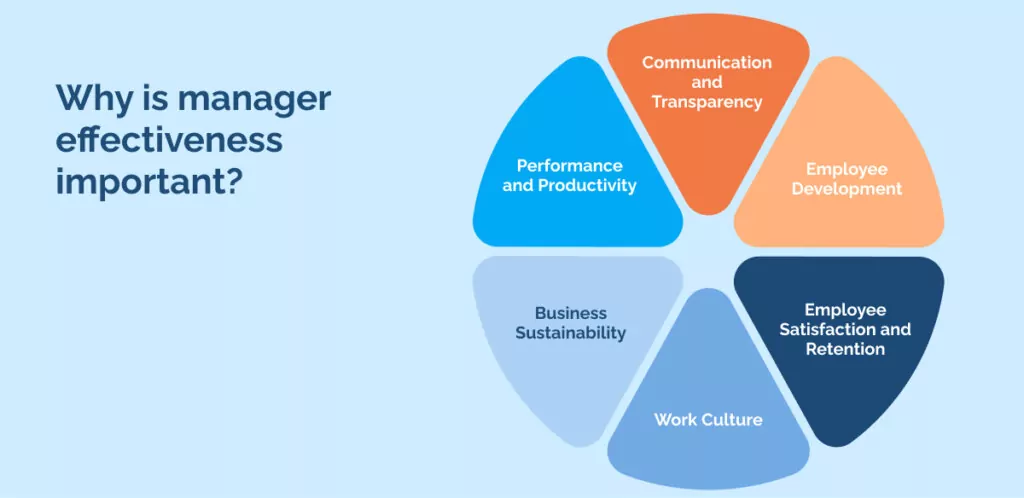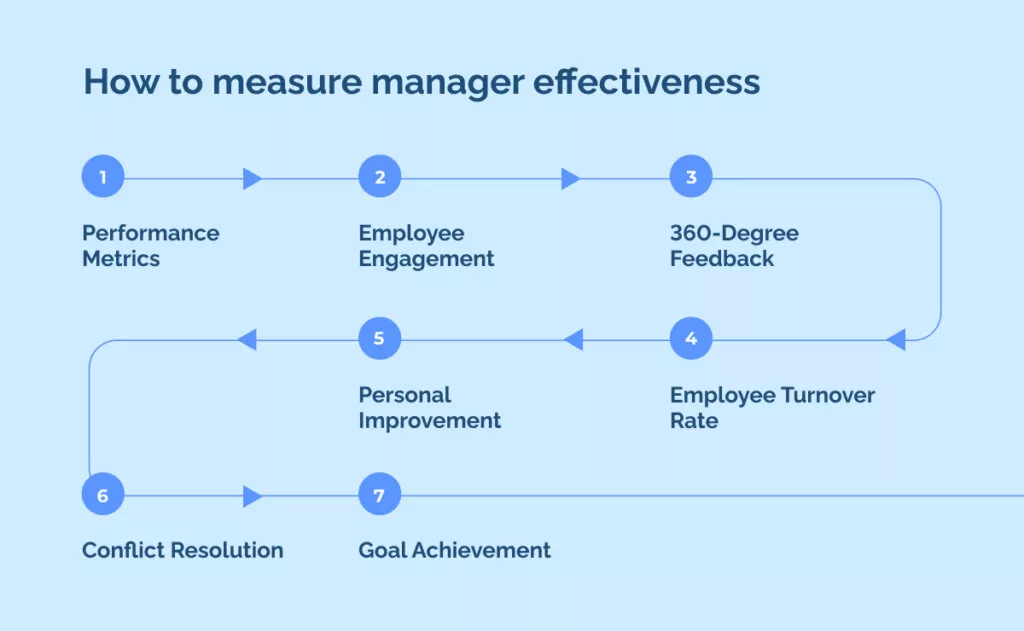
When it comes to achieving organizational goals, manager effectiveness is an indispensable skill to possess—particularly in guiding employees and teams toward goal completion.
Managerial effectiveness means demonstrating clear communication, actively listening, and understanding what the team needs—this results in a motivated team working productively, while promoting employee well-being and growth.
With advances in technology impacting sectors and disrupting business models worldwide, the scope of managers’ responsibilities has expanded to include empowering employees and embracing change for future success.
This article will delve into the concept of manager effectiveness, exploring strategies for improvement, identifying those who contribute to managerial effectiveness, and sharing best practices for effective management.
What is manager effectiveness?
Manager effectiveness measures a manager’s ability to successfully guide the development and considerations of teams or departments in achieving organizational objectives.
It is inherently tied to a manager’s capability to set strategic objectives, efficiently manage resources, and cultivate a positive, productive team environment.
Effective managers are distinguished by their strong communication skills and active listening abilities, enabling them to understand and respond to their team’s needs accurately. They also possess the knack for empowering employees fostering a sense of responsibility, motivation, and ownership among team members.
Manager effectiveness goes beyond achieving operational goals; it also encompasses promoting individual growth and well-being among employees.
Effective managers significantly contribute to employee training, satisfaction, and retention by providing professional development opportunities, constructive feedback, and a supportive work environment.
Why is manager effectiveness important?

Effective management is a cornerstone of any thriving business, as it’s essential for cultivating a positive future of work strategy, and enhancing employee satisfaction and retention.
Trust-building, inclusive decision-making, and exemplary personal conduct also form the bedrock of effective management—an approach that cultivates both team performance and individual advancement.
Managers play a vital role in the successful operation and long-term sustainability of an organization, making their effectiveness a key factor to prioritize.
According to a recent survey by Gallup, around 18% of individuals in managerial roles possess a high level of talent for managing others, while 20% exhibit basic talent in this area. Together, these capable managers contribute approximately 48% higher profits to their companies than their average counterparts.
It’s clear manager effectiveness is crucial in driving organizational success, as it directly impacts team performance, employee morale, and overall productivity.
Manager effectiveness is vital for an organization’s success for these reasons:
- Performance and Productivity: Effective managers lead high-performing teams, resulting in increased productivity. They set clear goals, offer guidance, and facilitate problem-solving, ensuring team members perform at their best.
- Communication and Transparency: With strong communication skills, effective managers ensure transparency in operations. This fosters trust within the team, promoting better collaboration and enhancing team dynamics.
- Employee Development: They play a significant role in employee growth by identifying individual strengths and areas for improvement. Providing opportunities for professional development and offering valuable, constructive feedback are key aspects of this role.
- Employee Satisfaction and Retention: By creating a supportive work environment, effective managers contribute to higher employee satisfaction. This leads to greater employee retention, critical for maintaining a stable, experienced workforce.
- Work Culture: They help shape a positive work culture by modeling and encouraging respectful and ethical behavior. This contributes to a healthier, more enjoyable workplace.
- Business Sustainability: Overall, manager effectiveness is essential for the long-term sustainability of a business. It ensures the achievement of organizational goals and helps build a resilient, adaptable team that can navigate various business challenges.
How to measure manager effectiveness

With a manager effectiveness assessment system, organizations can determine if the key drivers behind critical employee support structures, such as those in managerial positions, are effective.
This process allows managers to understand how well they are leading their teams, making decisions, and contributing to the company’s goals. It goes beyond just looking at output; it’s about evaluating communication skills, leadership style, and the ability to inspire and motivate.
According to a recent survey conducted by Gartner, enhancing the effectiveness of leaders and managers emerges as the primary focus for HR leaders in 2023, cited by 60% of respondents. This finding highlights the significance of prioritizing leadership development and management practices to drive organizational success.
Measuring manager effectiveness is crucial for organizational success. Here are seven ways to evaluate it:
- Performance Metrics
This involves tracking various performance management indicators of the team, such as project completion rates, quality of outputs, and meeting deadlines. A high-performing team is often a reflection of effective management. However, it’s essential to ensure that high performance is not achieved at the cost of team member burnout or unethical practices.
- Employee Engagement
An engaged employee is not just satisfied with their job but also enthusiastic about their work and committed to the organization. They are more likely to take the initiative and go the extra mile. If a manager can foster high levels of engagement within their team, it’s a strong sign of their effectiveness.
- 360-Degree Feedback
This comprehensive feedback approach involves collecting inputs about a manager’s performance from their superiors, peers, and subordinates. It provides a well-rounded view of their leadership style, communication skills, problem-solving abilities, and other managerial competencies.
- Employee Turnover Rate
A high turnover rate can be a red flag. It might indicate issues like lack of support, poor communication, or insufficient recognition from the manager. On the other hand, a low turnover rate often suggests that the manager successfully creates a positive and supportive work environment.
- Personal Improvement
Effective managers recognize the importance of continuous learning and personal growth. They seek out professional development opportunities and are open to feedback. They are adaptable and keen to improve their skills and knowledge to meet evolving business needs and challenges.
- Conflict Resolution
Conflict is inevitable in any team. The way a manager handles conflict can greatly impact team dynamics and productivity. Effective managers address conflicts in a fair, timely, and constructive manner, promoting open communication and fostering a culture of respect and understanding.
- Goal Achievement
The regular achievement of objectives is a clear indicator of a manager’s effectiveness. It shows their ability to guide their team towards successfully completing tasks. However, it’s important to ensure that top-level goals are realistic and aligned with the team’s capabilities and resources.
How to improve manager effectiveness

Recent McKinsey research shows that workplace relationships contribute to 39% of employees’ overall job satisfaction. Notably, connections with management are responsible for 86% of workers’ contentment with their interpersonal bonds in the workplace.
Developing strong managerial effectiveness is demonstrated via emotional intelligence skills, strategic goal-setting, offering constructive feedback, cultivating a healthy company culture, and leading by example.
Let’s take a closer look at proven ways effective managers improve their capabilities:
Prioritize Lifelong Learning
In an era of constant change, the ability to learn and adapt is a manager’s greatest asset.
Managers who commit to lifelong learning have the long game in mind—equipped with a map for navigating new challenges and prospective opportunities.
This isn’t just about formal education; it’s about cultivating a mindset of curiosity and openness. It involves seeking out new ideas, perspectives, and experiences—whether that’s through reading, networking, attending webinars, or simply being receptive to feedback.
As a leader, your learning journey can inspire your team to see the value in continuous progress, fostering healthy organizational dynamics.
Promote Transparent Communication
Transparent communication underpins effective leadership.
A manager who communicates openly helps build trust, aligns the team toward shared goals, and creates an environment where ideas flourish.
This involves expressing expectations clearly, listening actively, and encouraging dialogue. Regular team meetings, one-on-one check-ins, and open-door policies all facilitate transparent communication.
Importantly, it’s about creating a safe space where everyone feels heard and valued. In turn, this can boost morale, productivity, and employee engagement.
Cultivate Emotional Intelligence
Emotional intelligence is a key differentiator for successful managers.
It’s about understanding and managing your emotions—and those of others. Managers with high emotional intelligence can empathize with their team members, handle conflicts proactively, and foster positive relationships.
They’re also better equipped to manage stress, adapt to change, and navigate complex situations. Developing emotional intelligence involves self-awareness, self-regulation, motivation, empathy, and social skills.
Cultivating these qualities enables managers to lead more effectively and foster a supportive work environment.
Establish Clear Objectives
Setting clear objectives provides direction and focus.
For managers, it’s about translating the organization’s vision into actionable goals for the team. Establishing SMART goals—specific, measurable, achievable, relevant, and time-bound—can provide a clear direction and purpose for achieving manager effectiveness.
Regularly reviewing these objectives ensures everyone stays on track and understands their role in achieving the bigger picture.
It’s important to involve the team in the goal-setting process. This fosters a sense of ownership and engagement, driving better results.
Offer balanced feedback
Balanced feedback is crucial for individual and team growth.
It helps employees understand their strengths and areas for improvement. Managers should provide feedback that is timely, specific, and constructive.
It’s about recognizing good performance, addressing issues, and offering practical suggestions for improvement.
Delivering feedback with respect and empathy is crucial. It is important to focus on behaviors rather than personal traits. This approach can greatly enhance performance, motivation, and job satisfaction.
Encourage Team Autonomy
Empowering teams fosters a sense of responsibility and motivation.
Managers who delegate tasks, trust their team’s skills, and encourage initiative create an environment where people thrive.
This involves giving team members the freedom to make decisions, solve problems, and contribute ideas.
Empowering individuals to leverage their strengths, glean lessons from errors, and nurture professional growth is paramount. By doing so, managers can enhance productivity, foster innovation, and sustain employee engagement.
Demonstrate Leadership
Effective managers lead by example, setting the bar high for their team. They consistently embody the values, attitudes, and behaviors they expect from others, demonstrating unwavering integrity in their actions.
Respect is at the core of their leadership style, as they treat every team member with dignity and fairness. Moreover, they are committed to excellence, consistently striving for improvement and encouraging their team to do the same.
When managers act as role models, they inspire others to exceed expectations. Their exemplary leadership not only garners respect and trust but also cultivates a positive work culture where everyone feels valued and driven to succeed.
How can HR help improve manager effectiveness?
Human Resources (HR) plays a pivotal role in enhancing managerial effectiveness within an organization, with many strategies and resources being deployed with this objective in mind.
One way HR can enhance a manager’s effectiveness is through the provision of training programs designed to hone important skills such as communication, decision-making, and leadership.
Tailored to meet the specific needs of each manager, these programs focus on strengthening existing capabilities and improving areas of weakness.
In addition to training, HR can set up regular feedback mechanisms like performance appraisals or the aforementioned 360-degree feedback systems. This feedback is vital for managers to understand their areas of strength and those that require improvement.
Creating a supportive environment is another role HR plays in improving managerial effectiveness. This involves establishing open communication channels where managers can freely discuss challenges and seek advice. Resources for stress management and work-life balance are also provided, helping managers maintain their effectiveness amidst demanding roles.
HR plays a crucial role in establishing well-defined expectations and goals for managers. With this clarity, managers are empowered to lead with greater effectiveness, fully enabled to achieve their objectives.
What’s next for manager effectiveness?
Manager effectiveness in the future will be significantly shaped by advancements in digital adoption, digital transformation, and artificial intelligence (AI). These domains increasingly converge, creating a new terrain for evolving managerial roles.
Digital adoption is becoming a key competency for managers. As technology continues to evolve, managers must not only adapt but also lead their teams through these changes.
This means keeping a finger on the pulse of new tools, platforms, and systems and ensuring their effective use within the team. It may include seeking senior support to align technology strategy objectives with those of employee support and development.
Digital transformation, on the other hand, is redefining business models and operational processes. As per MarketsandMarkets, the digital transformation market is expected to reach USD 3.14 trillion by 2030—registering an annual growth rate of 24.1%.
Managers will play a key in this inevitable transformation, instrumental in driving change and ensuring alignment between technology initiatives and business objectives.
They’ll be expected to champion these transformations, overcome resistance, and build buy-in for organizations hoping to remain afloat in tomorrow’s digital-first world.
WalkMe Team
WalkMe spearheaded the Digital Adoption Platform (DAP) for associations to use the maximum capacity of their advanced resources. Utilizing man-made consciousness, AI, and context-oriented direction, WalkMe adds a powerful UI layer to raise the computerized proficiency, everything being equal.



